 It's been nearly a month since the New York Times misinformed readers by describing NJ Democratic Congressman Rush Holt's national election reform bill (H.R. 2894) by inaccurately writing that it "would require paper ballots to be used for every vote cast in November 2010."
It's been nearly a month since the New York Times misinformed readers by describing NJ Democratic Congressman Rush Holt's national election reform bill (H.R. 2894) by inaccurately writing that it "would require paper ballots to be used for every vote cast in November 2010."
As it's currently written, it will do no such thing. It won't be until 2014 that a paper ballot for "every vote cast" will be required.
Election integrity expert Ellen Theisen, of VotersUnite.org (who had previously endorsed the bill, until withdrawing the group's endorsement after a different provision was amended prior to final introduction), told us earlier this month she believed the Times' assertion, in the unbylined editorial, was a "glaring inaccuracy" and a "complete misrepresentation of the bill."
Election attorney John Bonifaz, director of VoterAction.org, which has fervently endorsed this version of Holt's bill, later concurred, in response to a request for comment from The BRAD BLOG, that the Times was inaccurate in its representation of the bill.
While the Times has yet to take note, or issue a correction, Holt himself has responded to our concerns by somewhat re-writing the bullet-point on his website --- which had previously offered inaccurate language describing the bill almost identical to the Times' mischaracterization --- in order to somewhat more accurately describe what the bill actually does...
As the legislation's mandate to eventually move from wholly unverifiable Direct Recording Electronic (DRE, usually touch-screen) voting machines to paper ballots by 2014, is one of the key provisions at the heart of Holt's sweeping legislation, the fact that the nation's "Paper of Record" would so utterly misdescribe that key provision --- in an editorial endorsement of the bill, of all things --- is simply remarkable. That they would go this long without issuing a correction --- despite our having notified their editors and even their Public Editor (ombudsmen) Clark Hoyt, without a response having been received from any of them --- is nothing short of astounding. But perhaps we're still too easily astounded these days.
As it turned out, while writing our initial follow-up article, a week after noting the Times error originally, we noticed that the Congressman himself had similarly misrepresented the bill on his U.S. House website page, where he described the bill by claiming that it "Requires a voter-marked or ballot-marking-device paper ballot be produced for every vote cast in time for the November 2010 elections."
So, it would seem, the NYTimes must have relied on Holt's summary language instead of having read the actual bill itself before deciding to bless it with its valued endorsement. We'd expect much better from the Times, but when it comes to future endorsements of legislation, we'll now consider ourselves forewarned: they seemingly rely on the often-misleading talking points of the author of the legislation, rather than bothering to read the actual bill.
The tortured wording of the amended language now on Holt's website --- in contrast to a simple correction, apologizing for the error, and stating what the bill actually will and won't do --- suggests the office is still more interested in misleading and/or confusing the public about the bill, rather than simply advocating and informing in favor of such an important piece of legislation for what it is.
Holt's initially incorrect language --- similar, almost to a word, to the Times inaccurate description of the bill --- was belied by the Congressman's very next bullet-point on the same webpage. The bill "Provides that printer-equipped electronic voting systems used in 2008 elections can be used after 2010 but are to be replaced with paper ballots before the first federal election in 2014," the webpage notes, in direct contrast to the original preceding point.
In the first point, Holt claimed the bill "Requires a ... paper ballot be produced for every vote cast in time for the November 2010 elections." And in the very next, he writes that electronic voting records "are to be replaced with paper ballots before the first federal election in 2014."
Having read virtually every iteration of the bill since the earliest drafts of its 2007 version, we can tell you, without question, that the second point is the correct assertion. The currently introduced version of the bill does not require paper ballots for all until 2014. That leaves us with a guarantee of millions of 100% unverifiable votes in the next two federal elections, one of them a Presidential election.
That the Times still finds such an egregious error unworthy of correction is, as mentioned, astounding.
Holt has now amended his website language, following our critical coverage, not with a simple correction/clarification, but by describing the bill's key requirement with the following tortured turn of phrase:
That, um, confusing wording is now posted instead of the previous, and wholly inaccurate:
The new wording, if one can parse it, more accurately describes the fact that the bill only requires the replacement of paperless DRE systems --- with either hand-marked paper ballots, or equally unverifiable machine-marked paper ballots --- in 2010. Those jurisdictions that currently use wholly unverifiable DREs with so-called "paper-trail" printers can continue using those machines --- despite the fact that they are as unverifiable as those without such printers --- until the 2014 elections.
"To the extent that the NYTimes relied on prior language from Holt's website to state that paper ballots would be required in all states by 2010," attorney Bonifaz, who endorses the bill, wrote to us in response to our query, "this amended language should clarify that for the newspaper."
We're not sure, however, that it much clarifies anything for anybody. In any case, the newspaper in question has still failed to issue a correction, nearly a full month after the original inaccurate editorial. Our queries to Holt's office, asking whether or not they've informed the Times of the error, have gone unanswered, though they have, as noted, made that slight amendment to their website, presumely in response to our concerns.
In the meantime, the front page of Holt's site still touts, and proudly links to, the Times' editorial endorsement (without noting its "glaring inaccuracy") by quoting the editorial's assertion: "Few issues matter as much as ensuring that election results can be trusted."
On that, both the Times and Holt are correct --- few issues matter as much. But after the importance of being able to trust election results, comes the importance of being able to trust both elected officials and the nation's top newspaper --- particularly when it comes to major, sweeping legislation. At this point, in this case, given the reckless behavior of each, there seems little reason to trust either of them.
CONTACTS
editorial@nytimes.com
letters@nytimes.com
Requests for Times corrections
Times' Public Editor, Clark Hoyt
Contact page for Rep. Rush Holt
The BRAD BLOG's latest analysis of the currently introduced Holt bill --- noting both its much needed reforms, as well as its serious dangers --- is posted here, for those who would prefer an accurate and unbiased look at the bill before deciding whether it's worth supporting, opposing, or working to see it improved before passage.
DISCLOSURE: In 2007 we were asked by Holt's office to review, and help draft, several versions of the bill before its introduction. Despite having had a hand in improving several provisions of that version of the bill, we did not ultimately endorse it due to numerous concerns, most notably its failure to ban DREs all together (thankfully, the new version does that, if only by 2014, and even then it allows for the type of unverifiable computer-marked paper ballots which misprinted 4 out of 12 of our own votes during a primary election in California last year), and the language which was severely rewritten in committee to federally institutionalize secret voting and tabulation software for use in public elections. Unfortunately, that latter concern still remains in the currently introduced 2009 version of the bill.


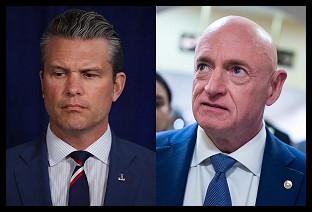 Court Blocks Hegseth Censure of Sen. Mark Kelly
Court Blocks Hegseth Censure of Sen. Mark Kelly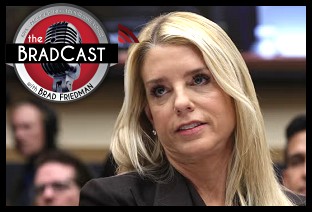 Harpy Tantrums, Legal Losses, Election Fails, Retreating ICE and Other Hopeful Signs: 'BradCast' 2/12/26
Harpy Tantrums, Legal Losses, Election Fails, Retreating ICE and Other Hopeful Signs: 'BradCast' 2/12/26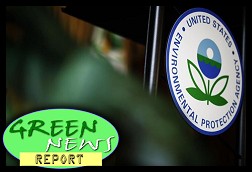 'Green News Report' 2/12/26
'Green News Report' 2/12/26
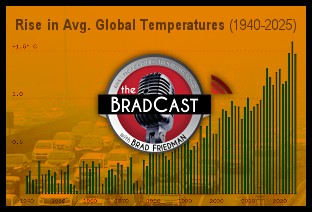 'Let Kids with Asthma Suffer': Trump to Reverse EPA's Landmark 'Endangerment Finding': 'BradCast' 2/11/26
'Let Kids with Asthma Suffer': Trump to Reverse EPA's Landmark 'Endangerment Finding': 'BradCast' 2/11/26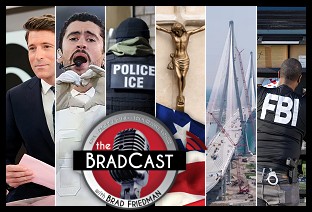 Trump's Presidency Now About Little More Than Racism, Corruption, Culture War Nonsense: 'BradCast' 2/10/26
Trump's Presidency Now About Little More Than Racism, Corruption, Culture War Nonsense: 'BradCast' 2/10/26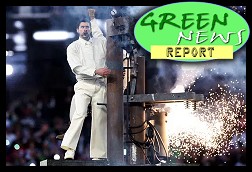 'Green News Report' 2/10/26
'Green News Report' 2/10/26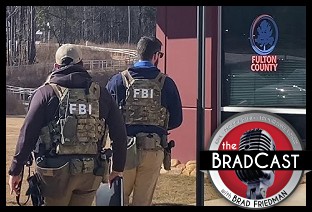 About Trump's FBI Raid of the Fulton County, GA Elections Warehouse: 'BradCast' 2/9/26
About Trump's FBI Raid of the Fulton County, GA Elections Warehouse: 'BradCast' 2/9/26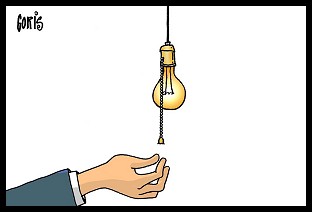 Sunday 'Dead in Darkness' Toons
Sunday 'Dead in Darkness' Toons 'New START' Treaty Allowed to End Amid New World Disorder: 'BradCast' 2/5/26
'New START' Treaty Allowed to End Amid New World Disorder: 'BradCast' 2/5/26 'Green News Report' 2/5/26
'Green News Report' 2/5/26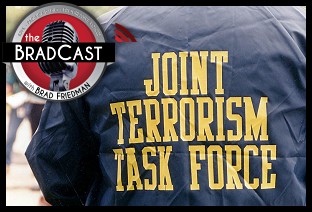 Trump Turns 'War on Terror' Tools Against Domestic Political Foes: 'BradCast' 2/4/26
Trump Turns 'War on Terror' Tools Against Domestic Political Foes: 'BradCast' 2/4/26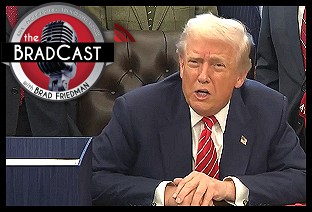 Losing Legally and Politically, Trump Threatens to 'Nationalize' Elections: 'BradCast' 2/3/26
Losing Legally and Politically, Trump Threatens to 'Nationalize' Elections: 'BradCast' 2/3/26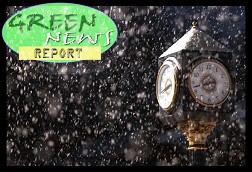 'Green News Report' 2/3/26
'Green News Report' 2/3/26 Bad and Good Bunnies, and an Electoral Shock in Deep 'Red' TX: 'BradCast' 2/2/26
Bad and Good Bunnies, and an Electoral Shock in Deep 'Red' TX: 'BradCast' 2/2/26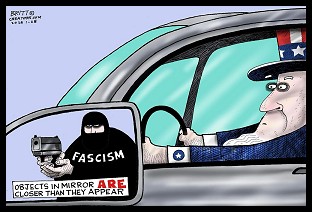 Sunday 'Mirror, Mirror' Toons
Sunday 'Mirror, Mirror' Toons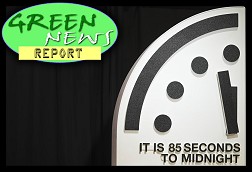 'Green News Report' 1/29/26
'Green News Report' 1/29/26 It's About Elections and the Windmills of His Mind: 'BradCast' 1/29/26
It's About Elections and the Windmills of His Mind: 'BradCast' 1/29/26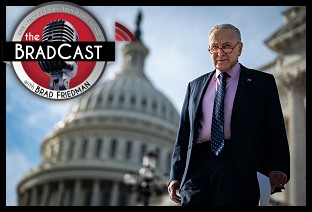 Govt Shutdown Over ICE Funding Near Certain This Weekend: 'BradCast' 1/28/26
Govt Shutdown Over ICE Funding Near Certain This Weekend: 'BradCast' 1/28/26 Trump Blinks, Bovino Out, MN Op Falters, Persists as Midterms Loom: 'BradCast' 1/27
Trump Blinks, Bovino Out, MN Op Falters, Persists as Midterms Loom: 'BradCast' 1/27  The ICE Murder of ICU Nurse Alex Pretti and the Heroes of Mpls: 'BradCast' 1/26/26
The ICE Murder of ICU Nurse Alex Pretti and the Heroes of Mpls: 'BradCast' 1/26/26 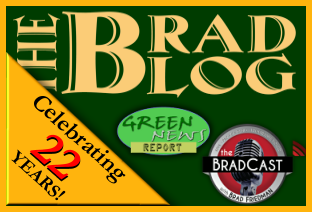 The BRAD BLOG: 22 Years and Still Counting
The BRAD BLOG: 22 Years and Still Counting Mr. Smith Testifies (Publicly) in Washington: 'BradCast' 1/22/26
Mr. Smith Testifies (Publicly) in Washington: 'BradCast' 1/22/26 World Turning Against Self-Destructing U.S. Under Trump: 'BradCast' 1/21/26
World Turning Against Self-Destructing U.S. Under Trump: 'BradCast' 1/21/26 Trump Waste, Fraud, Abuse on Voting, at DOJ, by DOGE: 'BradCast' 1/20/26
Trump Waste, Fraud, Abuse on Voting, at DOJ, by DOGE: 'BradCast' 1/20/26
 VA GOP VOTER REG FRAUDSTER OFF HOOK
VA GOP VOTER REG FRAUDSTER OFF HOOK Criminal GOP Voter Registration Fraud Probe Expanding in VA
Criminal GOP Voter Registration Fraud Probe Expanding in VA DOJ PROBE SOUGHT AFTER VA ARREST
DOJ PROBE SOUGHT AFTER VA ARREST Arrest in VA: GOP Voter Reg Scandal Widens
Arrest in VA: GOP Voter Reg Scandal Widens ALL TOGETHER: ROVE, SPROUL, KOCHS, RNC
ALL TOGETHER: ROVE, SPROUL, KOCHS, RNC LATimes: RNC's 'Fired' Sproul Working for Repubs in 'as Many as 30 States'
LATimes: RNC's 'Fired' Sproul Working for Repubs in 'as Many as 30 States' 'Fired' Sproul Group 'Cloned', Still Working for Republicans in At Least 10 States
'Fired' Sproul Group 'Cloned', Still Working for Republicans in At Least 10 States FINALLY: FOX ON GOP REG FRAUD SCANDAL
FINALLY: FOX ON GOP REG FRAUD SCANDAL COLORADO FOLLOWS FLORIDA WITH GOP CRIMINAL INVESTIGATION
COLORADO FOLLOWS FLORIDA WITH GOP CRIMINAL INVESTIGATION CRIMINAL PROBE LAUNCHED INTO GOP VOTER REGISTRATION FRAUD SCANDAL IN FL
CRIMINAL PROBE LAUNCHED INTO GOP VOTER REGISTRATION FRAUD SCANDAL IN FL Brad Breaks PA Photo ID & GOP Registration Fraud Scandal News on Hartmann TV
Brad Breaks PA Photo ID & GOP Registration Fraud Scandal News on Hartmann TV  CAUGHT ON TAPE: COORDINATED NATIONWIDE GOP VOTER REG SCAM
CAUGHT ON TAPE: COORDINATED NATIONWIDE GOP VOTER REG SCAM CRIMINAL ELECTION FRAUD COMPLAINT FILED AGAINST GOP 'FRAUD' FIRM
CRIMINAL ELECTION FRAUD COMPLAINT FILED AGAINST GOP 'FRAUD' FIRM RICK SCOTT GETS ROLLED IN GOP REGISTRATION FRAUD SCANDAL
RICK SCOTT GETS ROLLED IN GOP REGISTRATION FRAUD SCANDAL VIDEO: Brad Breaks GOP Reg Fraud Scandal on Hartmann TV
VIDEO: Brad Breaks GOP Reg Fraud Scandal on Hartmann TV RNC FIRES NATIONAL VOTER REGISTRATION FIRM FOR FRAUD
RNC FIRES NATIONAL VOTER REGISTRATION FIRM FOR FRAUD EXCLUSIVE: Intvw w/ FL Official Who First Discovered GOP Reg Fraud
EXCLUSIVE: Intvw w/ FL Official Who First Discovered GOP Reg Fraud GOP REGISTRATION FRAUD FOUND IN FL
GOP REGISTRATION FRAUD FOUND IN FL

































